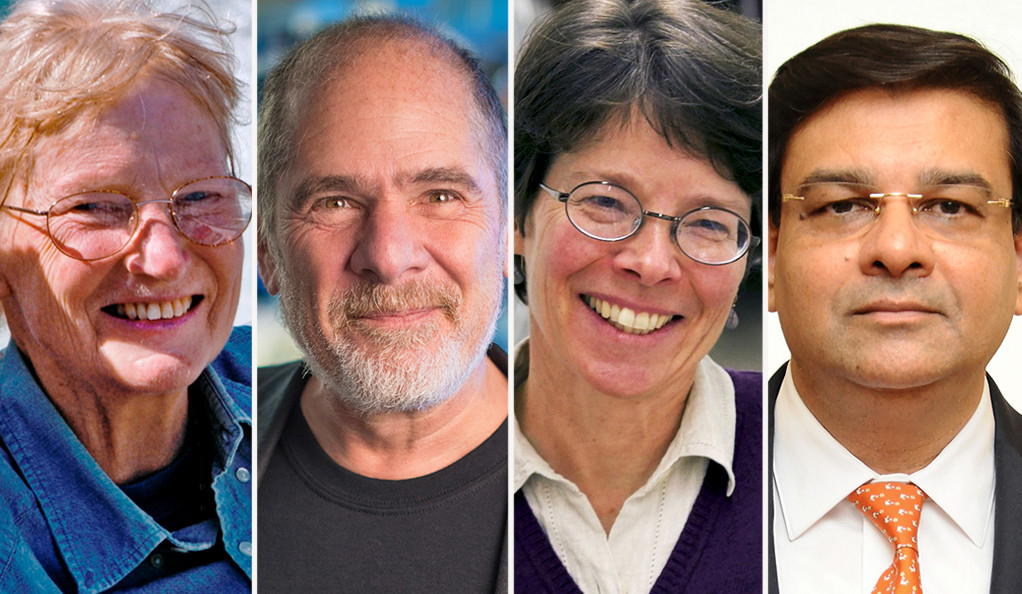
YaleNews
The governor of the Reserve Bank of India and an acclaimed cancer researcher are among the four alumni of the Yale Graduate School of Arts and Sciences to receive the 2019 Wilbur Lucius Cross Medals for Alumni Achievement in honor of their exceptional work across various fields.
The Graduate School and its Alumni Association award the medals yearly to alumni who have made outstanding contributions to scholarship, public service, teaching or academic administration. This year’s honorees are philosopher Ruth Millikan GRD ’69; immunologist Douglas Green ’77 GRD ’81; geologist Susan Kidwell GRD ’82; and economist Urjit Patel GRD ’90.
“[The medal] is the highest honor an alumnus can receive from the University,” said Jasmina Besirevic-Regan GRD ’04, associate dean of the Graduate School and former dean of Trumbull College, who coordinates the Cross Awards.
The medals recognize the legacy of literary critic Wilbur Lucius Cross, Graduate School class of 1889, who served as both a professor in the Sheffield Scientific School — a precursor to the Graduate School — and a dean in the newly formed Graduate School until 1930. Cross went on to serve as governor of Connecticut from 1930 to 1939.The Cross Medal recipients are identified through an internal process of nomination, recommendation and review, typically beginning in November every year.
The only 2019 recipient to have also earned a bachelor’s degree from Yale, Green, an immunologist, has published over 600 papers, commentaries and books. His research has focused on the process of active cell death and cell survival, most recently discovering the process of LC3-associated phagocytosis, the process of cell autocannibalism in response to insufficient nutrients. In 2017, Green was awarded the Jurg Tschopp Prize for research on cell death. He currently holds the Peter C. Doherty endowed chair of immunology at St. Jude Children’s Research Hospital in Memphis, Tennessee, where he is researching the link between LC3-associated phagocytosis and Alzheimer’s disease.
Green completed postdoctoral work on marine biology in the lab of Yale professor emeritus of ecology and evolutionary biology Leo Buss. In an interview with the News, Green said that Buss was the driving force behind his transition from solely studying immunology to conducting new research on apoptosis, which he pursued for the next 30 years. A member of Jonathan Edwards College as an undergraduate, Green fondly recalled his time at Yale, characterizing it as a “petri dish.”
“[I] came from a farm town in Massachusetts and was thrown in with amazing, talented, brilliant people. … We would just sit around and talk all the time,” he told the News. “Growing up in a small town, I thought anything was possible, and here I suddenly was at Yale and everything was possible, everything was open, everything was there to explore, and everybody encouraged it.”
Millikan earned her Ph.D. in philosophy from Yale in 1969. Since releasing her first book in 1984, she has become known as a philosopher of biosemantics, winning the Rolf Schock Prize for Logic and Philosophy and the Jean Nicod Prize in Cognitive Science, among others. She is particularly well-known for her 2017 publication of “Beyond Concepts: Unicepts, Language, and Natural Information.” She has taught at Berea College, the University of Western Michigan and several foreign universities. Millikan is currently a professor of philosophy at the University of Connecticut.
Millikan’s graduation coincided with another historic moment for the University: the 1969 decision to admit female students to Yale College. Reflecting on her experience in the Graduate School, she remembered feeling like the school was “definitely set up for men,” without any athletic facilities available to women and some men-only reading rooms. Millikan was the first female usher to work a concert in Woolsey Hall.
“At that time, Yale was pretty difficult for women in subtle, nasty ways, but the education … I am just so grateful for,” Millikan said in an interview with the News.
Patel, the most recent graduate, served as the governor of India’s Reserve Bank from September 2016 to December 2018. He has also served on the boards of the Bank of International Settlements and the Financial Stability Institute. The author or co-author of 40 scholarly papers, he gives lectures on public finance, the Indian financial sector and the economics of climate change, among other topics. Patel is currently an honorary fellow of Linacre College at Oxford.
Kidwell, who earned her doctorate from Yale in geology and geophysics in 1982, has primarily investigated the formation of the fossil record and the present-day state of biodiversity. A fellow of the American Academy of Arts and Sciences and the American Association for the Advancement of Science, she was awarded the Mary Clark Thompson Medal from the U.S. National Academy Sciences in 2015. She is currently the William Rainey Harper professor in geophysical sciences at the University of Chicago.
Neither Kidwell nor Patel could be reached for comment.
Each recipient will present a talk on their work when they return to the University on Oct. 7 for the awards ceremony.
Olivia Tucker | olivia.tucker@yale.edu







